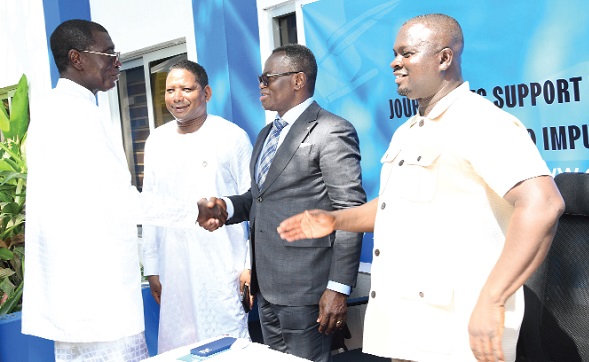
GJA launches GH¢2m support fund
The Ghana Journalists Association (GJA) has launched a GH¢2 million support fund to assist journalists who are violated in the line of duty.
The fund, to be known as the Journalists Support Fund (JSF), will also be used to organise training and workshops on safety and security for members of the GJA.
Advertisement
The President of the GJA, Albert Kwabena Dwumfour, speaking at the launch of the fund, said the era when journalists could not afford lawyers to enable them to seek redress at the courts when assaulted was over.
"The era when journalists were assaulted but they did not get justice due to lack of funds to pursue legal action will soon become history.
“Lack of urgency, welfare issues, attacks on journalists will no longer exist. This is an era of hope and genuine solidarity with all Ghanaian journalists. We must work without fear or panic," he emphasised.
Additionally, he said, the fund would be used to cushion journalists financially during crises, such as accidents, ill-health, among others, and also support retirees in distress.
Launch
The launch, which took place in Accra yesterday, coincided with the commemoration of the International Day to End Impunity for Crimes Against Journalists.
Apart from the executives of the GJA, media practitioners, representatives from the Police Service, politicians and other stakeholders were also present.
Notable among them were the Chairman of the National Media Commission (NMC), Yaw Boadu-Ayeboafoh; former Presidents of the GJA, Gifty Afenyi-Dadzie and Ajoa Yeboah-Afari; a former Director of News, Graphic Communications Group Ltd, Mavis Kitcher; a former Night Editor of the Daily Graphic, Vance Azu; the Chancellor of the Wisconsin International University College, Ghana, Dr Paul Kofi Fynn, and the world evangelist, Dr Lawrence Tetteh.
A Justice of the Supreme Court, Mr Justice Yonny Kulendi, and Dr Fynn assisted Mr Dwumfour to jointly launch the fund.
An appeal to raise seed money for the fund yielded about GH¢30,000, with donations from the Police Service, Justice Kulendi, Dr Tetteh and some other individuals.
Attack
Mr Dwumfour noted that attacks on journalists had, over the period, remained a major concern to the association.
“Many journalists have suffered attacks and gone through excruciating pain over the years and the impunity continues unabated.
“What is more worrying is the fact that, invariably, the victims of such crimes do not get justice. Journalism is not a crime and the lives of journalists are important to us.
“We believe that establishing the fund will go a long way towards assisting journalists who are attacked by covering their medical and legal expenses,” the GJA President explained and called for support for the fund.
Mr Dwumfour, touching on Ghana’s drop in the World Press Freedom index ranking, noted that the gruesome murder of investigative journalist Ahmed Suale, the arrest and detention of some journalists in the country, as well as poor economic conditions, were part of the reasons Ghana fared poorly in the ranking by the Rapporteur Sans Frontières.
“All these, including low pay, are the reasons Ghana moved from the 30th position to 60th. The attacks and rampant arrest of journalists as though they were criminals send a worrying signal to international media watchers who regard Ghana as a reference point for press freedom and democracy in Africa,” he emphasised.
Mr Dwumfour thus appealed to the Ghana Police Service to do all they could to bring the killers of Ahmed Suale to book.
“We trust our men in black will do this to honour his memory,” he said.
Peace
The Chairman for the occasion, the President of the COA Mixture Manufacturing Company Limited and Centre of Awareness and Global Peace Mission (COA-GPM), Professor Samuel Ato Duncan, who donated a cheque for GH¢100,000 as part of his pledge to contribute GH¢500,000 to the fund, said the media played a vital role in promoting peace and so they should be allowed to operate without fear.
“I am a promoter of global peace and press freedom and I know the importance of the media and the role they play in promoting global peace.
“I am also aware of the challenges and risks journalists and media practitioners go through in discharging their professional and constitutional mandate. We need to change that narrative,” he said.
Collective Measures
The Director-General of the United Nations Educational, Scientific and Cultural Organisation (UNESCO), Audrey Azoulay, said achieving media freedom required collective measures.
“Indeed, the safety of journalists, their freedom of expression and the free flow of information are pillars of democratic life and a prerequisite for all human rights. To achieve these goals, we must work collectively,” she said.
No to violence
Justice Kulendi, who spoke on behalf of the Chief Justice, Justice Kwasi Anin Yeboah, while commending the GJA for the JSF initiative, stressed that violence should not be tolerated in the media space.
“We must say no to violence; no form of violence is justifiable in a democracy,” he said.




